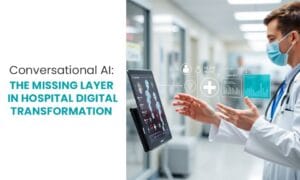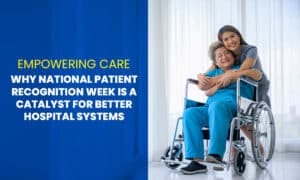
The healthcare landscape is undergoing a profound transformation, driven by the relentless advancement of technology. At the forefront of this revolution stands artificial intelligence in healthcare, poised to reshape every facet of patient care, operational efficiency, and medical discovery. The rise of AI in healthcare applications marks a new era where intelligent machines assist human experts, leading to unprecedented improvements. This paradigm shift holds immense promise for improving patient outcomes and revolutionising how healthcare systems operate globally.
The Rise of Artificial Intelligence in Healthcare Applications
For decades, medical professionals have grappled with overwhelming amounts of data – patient records, research papers, clinical trial results, and diagnostic images. This data deluge often hinders efficient decision-making and slows down the pace of innovation. Enter AI in healthcare, with its extraordinary ability to process, analyse, and derive insights from vast and complex datasets at speeds and scales impossible for humans. This capability forms the bedrock of AI’s burgeoning influence in healthcare.
AI is not merely a tool; it represents a fundamental shift in how we approach medical challenges. From early disease detection to personalised treatment plans, AI-driven solutions are demonstrating their potential across various specialities. This technological evolution allows healthcare providers to move from reactive treatments to proactive interventions, ultimately enhancing the quality of care and optimising resource allocation. The integration of AI into existing healthcare infrastructure is a gradual but accelerating process, paving the way for a more intelligent and responsive health system.
Also Read- AI in Healthcare: Myths vs Facts
Features of AI-Powered Health Companions
| Feature | Description |
| Symptom Checker | Offers early analysis based on reported symptoms and medical history |
| Medication Tracker | Sends alerts for medication doses and missed intake reminders |
| Health Coaching | Delivers real-time lifestyle and wellness advice personalized to patient needs |
| Remote Monitoring | Tracks vitals like glucose or oxygen and notifies physicians on abnormalities |
| Virtual Consultations | Connects patients with doctors for immediate telehealth care |
This table outlines the core features of AI-powered health companions currently revolutionising patient care. It includes tools like symptom checkers, medication trackers, and virtual consultations that enhance healthcare accessibility and engagement. Each feature plays a critical role in providing continuous support and personalised medical guidance, helping reduce hospital visits and improve long-term outcomes. These digital tools are particularly impactful for patients with chronic conditions, ensuring real-time communication and proactive care.
Top-Notch Features of AI-Powered Health Companions
The concept of an AI-powered health companion is rapidly moving from science fiction to reality, offering individuals a personalised and accessible gateway to better health management. These intelligent companions leverage AI to provide a range of features designed to empower users and support their well-being.
Key features often include:
• Symptom Assessment and Triage:
Users describe their symptoms, and the AI companion analyses the input, comparing it against extensive medical databases to suggest possible conditions or recommend seeking professional medical attention. This feature facilitates early detection and appropriate care pathways.
• Personalised Health Insights and Coaching:
By analysing an individual’s health data, including wearable device information, dietary habits, and genetic predispositions, the AI companion delivers tailored recommendations for exercise, nutrition, and lifestyle modifications. This fosters a proactive approach to health.
• Medication Reminders and Adherence Tracking:
AI-powered companions send timely reminders for medication intake, track adherence, and provide information about potential drug interactions. This significantly improves patient compliance with treatment regimens.
• Chronic Condition Management:
For individuals living with chronic diseases, the AI companion offers continuous monitoring of vital signs, glucose levels, or blood pressure, alerting users and their healthcare providers to concerning trends or potential complications.
• Mental Wellness Support:
Some advanced companions incorporate AI-driven conversational agents that provide emotional support, guided meditation, and coping strategies for stress, anxiety, or other mental health concerns, acting as a discreet and always-available resource.
• Seamless Data Integration:
These companions seamlessly integrate with electronic health records (EHRs) and other health devices, creating a holistic view of the user’s health journey for both the individual and their medical team.
• Virtual Consultations and Telemedicine Facilitation:
AI assists in scheduling virtual appointments and often provides preliminary information before a telehealth consultation, streamlining the process and improving accessibility to care, especially in remote areas.
These features demonstrate how an AI-powered health companion can act as a personal health advocate, promoting engagement, adherence, and ultimately, better health outcomes.

Major Methods AI Can Lead to Drastic Impact on the Healthcare Sector
Artificial intelligence in healthcare is not a singular solution but a diverse set of technologies, each offering unique contributions to revolutionise the sector. Here are 12 major methods illustrating the profound impact of AI on healthcare:
1) Enhancing Diagnostic Accuracy and Speed
AI algorithms, especially those employing deep learning, excel at analysing complex medical images like X-rays, MRIs, and CT scans with remarkable precision. They identify subtle patterns and anomalies often missed by the human eye, leading to earlier and more accurate diagnoses of conditions such as cancer, neurological disorders, and cardiovascular diseases. This direct application of artificial intelligence in healthcare significantly reduces diagnostic errors and improves the speed of detection, directly impacting how does AI improve patient outcomes.
2) Accelerating Drug Discovery and Development
The traditional process of drug development is notoriously time-consuming and expensive. AI dramatically accelerates this by identifying potential drug candidates, predicting their efficacy and safety profiles, and optimising molecular structures. AI-driven simulations allow researchers to screen vast libraries of compounds virtually, reducing the need for costly and lengthy wet-lab experiments. This speeds up the delivery of life-saving medications to patients.
3) Personalised Treatment Plans and Precision Medicine
AI analyses an individual’s unique genetic makeup, lifestyle, medical history, and environmental factors to create highly personalised treatment plans. This approach, known as precision medicine, ensures therapies are optimally tailored for each patient, maximising effectiveness and minimising adverse side effects. This method directly answers the question of how does AI improve patient outcomes by providing bespoke medical care.
4) Improving Electronic Health Record (EHR) Management
While EHRs digitised patient information, managing and extracting actionable insights from them remains challenging. AI-powered natural language processing (NLP) tools extract critical information from unstructured clinical notes, automate data entry, and synthesise patient data for clinicians. This reduces administrative burden, frees up healthcare professionals to focus on patient care, and improves data quality for better clinical decision support systems.
5) Optimising Hospital Operations and Resource Allocation
AI algorithms analyse historical data to predict patient admissions, optimise staff scheduling, manage bed availability, and streamline supply chain logistics. This leads to more efficient hospital operations, reduces patient wait times, and improves the overall patient experience. This directly contributes to ways to improve healthcare system efficiency.
6) Revolutionising Preventive Care and Population Health
AI identifies individuals at high risk for developing chronic diseases or experiencing adverse health events by analysing large datasets of public health information and individual patient data. This allows for proactive interventions, personalised prevention strategies, and targeted public health campaigns, shifting the focus from treating illness to maintaining wellness. This is a crucial area for how will AI affect the healthcare industry in a positive way.
7) Enhancing Clinical Decision Support Systems
AI integrates vast amounts of medical knowledge, patient data, and real-time information to provide clinicians with evidence-based recommendations at the point of care. These clinical decision support systems help doctors make more informed decisions, especially in complex cases, reducing diagnostic errors and improving treatment consistency.
8) Powering Remote Patient Monitoring and Telemedicine
Wearable devices and remote sensors, coupled with AI, continuously monitor vital signs, activity levels, and other health metrics. AI analyses this real-time data, identifies deviations from baseline, and alerts healthcare providers to potential issues. This facilitates continuous care, especially for chronic conditions, and expands the reach of healthcare through telemedicine, particularly for underserved populations.
9) Automating Administrative Tasks and Reducing Burnout
Healthcare professionals spend significant time on administrative tasks like billing, coding, and scheduling. AI automates many of these mundane, repetitive processes, reducing the administrative burden on staff and minimising errors. This frees up valuable time for clinicians to engage directly with patients, combating burnout and improving job satisfaction. This contributes significantly to ways to improve healthcare system efficiency.
10) Driving Medical Research and Knowledge Discovery
AI rapidly sifts through immense volumes of medical literature, research papers, and clinical trial data to identify emerging trends, correlations, and potential breakthroughs. This accelerates the pace of medical discovery and helps researchers uncover novel insights that might otherwise remain hidden.
11) Improving Patient Engagement and Education
AI-powered chatbots and virtual assistants provide patients with accessible, accurate information about their conditions, medications, and treatment options. They answer frequently asked questions, offer educational content, and empower patients to take a more active role in managing their health. This proactive engagement directly contributes to how does AI improve patient outcomes.
12) Predicting Disease Outbreaks and Managing Public Health Crises
AI models analyse epidemiological data, social media trends, and environmental factors to predict the spread of infectious diseases and identify potential outbreaks early. This enables public health officials to implement timely interventions, allocate resources effectively, and mitigate the impact of health crises, demonstrating a broad impact of AI on healthcare.

How AI Helps to Improve Patient Outcomes
The central aim of integrating artificial intelligence in healthcare is to enhance patient outcomes, and AI achieves this through several critical pathways. Firstly, AI’s unparallelled ability to process and analyse massive datasets leads to enhanced diagnostic accuracy. AI identifies diseases earlier and more precisely than traditional methods, often detecting subtle indicators missed by human observation. This early and accurate diagnosis is paramount for initiating timely and effective treatment, directly preventing disease progression and improving prognosis.
Secondly, AI facilitates personalised treatment plans. By considering an individual’s unique biological, genetic, and lifestyle factors, AI helps clinicians tailor therapies that are most likely to succeed for that specific patient. This precision medicine approach minimises trial-and-error, reduces adverse drug reactions, and optimises therapeutic efficacy, leading to faster recovery and better quality of life.
Thirdly, AI-powered remote monitoring and predictive analytics enable proactive intervention. AI continuously tracks patient health data from wearables and other devices, identifying early signs of deterioration or potential complications. This allows healthcare providers to intervene before a crisis occurs, preventing hospital readmissions and managing chronic conditions more effectively.
Finally, AI streamlines administrative processes and automates routine tasks, freeing up healthcare professionals to devote more time and attention to direct patient care. This reduction in administrative burden alleviates clinician burnout and fosters more meaningful patient-provider interactions, ultimately contributing to a more patient-centric and effective healthcare system. The collective effect of these AI applications is a healthcare ecosystem that is more precise, proactive, and personalised, significantly improving the overall well-being and longevity of patients.
Conclusion
Artificial intelligence in healthcare is here to stay—and it’s improving every aspect of care. Whether it’s delivering accurate diagnoses, powering robotic surgeries, or enabling 24/7 virtual care, AI is changing how medicine is practised. The 12 methods covered above offer clear, detailed insight into how AI will affect the healthcare industry. These points clarify the significant potential to improve patient outcomes. So we can surely say that the future of healthcare will be bright. AI-powered health companion features and clinical decision support systems become standard, which will make healthcare perspectives intelligent, efficient, and personalised.





